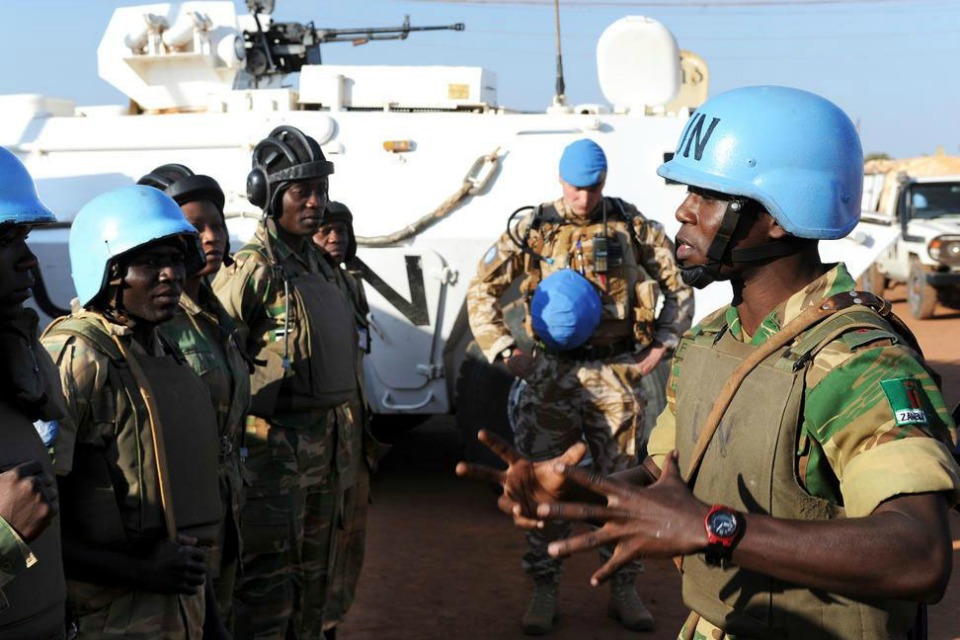"In the darkest moments of conflict, people across the world look at the UN and its peacekeepers for protection."
Statement by Ambassador Matthew Rycroft of the UK Mission to the UN at the Security Council Meeting on Peacekeeping Operations

Thank you Mr President.
I welcome this opportunity for a candid and constructive discussion with the Force Commanders. Thank you to Mr Ladsous and to the three Generals for their informative briefings and I look forward to their responses to our questions.
I’d like to take the opportunity first of all to pay tribute to all the Force Commanders for their service and their leadership, and to the men and women who serve in, and who support, the UN’s peace operations. You are all at the sharpest edge of this Council’s efforts to preserve international peace and security, putting your lives on the line in the most challenging environments. And sadly, as we have seen in places such as Mali and South Sudan, this dedication comes at a tragic cost.
Your insights into the reality on the ground, and the constraints you face, are invaluable to this Council’s decision making on your mandates - and ultimately to promoting international peace and security. So I encourage you to be open and frank so that we can provide you with the best possible support. This need for greater transparency and accountability was also a strong feature of yesterday’s Peace Operations Review Panel. And as they said in relation to allegations of sexual exploitation and abuse, zero tolerance must mean zero tolerance. All troop contributing countries must follow up any such allegations involving their troops robustly and report back to the United Nations. More broadly, we favour honest and open communications, including through meetings such as this one, to create ever greater openness about peacekeeping more broadly.
Mr President,
The Protection of Civilians is an issue that the UK cares deeply about. In the darkest moments of conflict, people across the world look to the UN and its peacekeepers for reassurance and protection. We all have a responsibility to deliver. To do so, it is critical that UN peacekeepers be prepared to use force, where necessary and within their mandate, to protect civilians when they are under immediate threat.
The principle of protecting civilians is now widely supported by the UN and Member States. Yet the question of how peacekeepers make the decision to intervene, and how they choose to intervene, still poses huge problems.
So we need your honest assessments of what is and what isn’t working, of what is and what isn’t possible. And in turn we will be honest with you about what resources and equipment we can provide. So let me ask the Generals, what do you and other Force Commanders need from this Council to enable your missions to protect civilians effectively? What more can we do, beyond providing more resources? And how can we work with you to keep the host government accountable for protecting its civilians, particularly in cases like South Sudan where it has so clearly failed to provide that protection so far? A few weeks ago, Rwanda launched an initiative to encourage all troop contributing countries to agree a set of pledges to protect civilians better. The United Kingdom considers this initiative a great step forward. I’d be interested to hear your views, and those of other Force Commanders in the room. Mr President, Let me turn now to the threat posed by asymmetric environments set out so clearly by the MINUSMA Force Commander. As new challenges to international peace and security emerge, new technology will have to play a greater role. But in order to be effective, that new technology must be supported by training and exercising and must be used by troops who come ready and willing to meet evolving threats. So pre-deployment training is crucial here. Particularly in cultivating the right mindset and skills to confront asymmetric threats, so that troops stand their ground when protecting civilians. So I am interested to hear your views on how we can better instil the necessary proactive and creative mindset needed by all peacekeepers that are deployed to modern peacekeeping missions.
Mr President,
In the spirit of openness and transparency, I also believe it is time for us to have a more honest conversation, begun today, about the national caveats of troop contributing countries. I welcome the comments by Major General Finn. Like it or not, caveats exist, and we need to work and plan around them. That can only happen if we are clear on what we’re prepared to allow our troops to do from the outset. We must also be upfront about changes in caveats over time – particularly as the nature of a mission or conflict changes. Caveats often don’t become apparent until a situation deteriorates; leaving Force Commanders unclear on what their troops can and can’t do. It is this uncertainty that leads to problems. In the worst circumstances, it can lead to command and control failures that put lives of troops and civilians at risk.
So let me close by asking all the Force Commanders here today, what more can the Council and the Secretariat do to reduce these caveats, to ensure that you and the mission leaders are aware of caveats that remain from the outset? What more can we do to reinforce the importance of the chain of command? Thank you Generals again for your briefings today, and to all Force Commanders for coming to today’s session. I look forward to hearing your views.
Thank you.